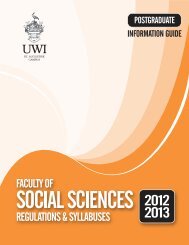Faculty of Humanities and Education (Postgraduate) - The University ...
Faculty of Humanities and Education (Postgraduate) - The University ...
Faculty of Humanities and Education (Postgraduate) - The University ...
Create successful ePaper yourself
Turn your PDF publications into a flip-book with our unique Google optimized e-Paper software.
POSTGRADUATE REGULATIONS & SYLLABUSES 2012 - 2013<br />
THE FACULTY OF HUMANITIES & EDUCATION<br />
YEAR:<br />
SEMESTER:<br />
COURSE CODE: EDEA 6114, EDEA 6119, EDEA 6122<br />
COURSE TITLE: PRACTICUM I, II, AND III<br />
NUMBER OF CREDITS: 4<br />
COURSE DESCRIPTION:<br />
Overview<br />
<strong>The</strong> Practicum is a 12-credit course divided <strong>and</strong> coded as<br />
follows:<br />
• (2 credits) (EDEA 6114)<br />
• (4 credits) (EDEA 6119)<br />
• (6 credits) (EDEA 6122)<br />
For the attainment <strong>of</strong> the 12 credits, the student must<br />
complete all parts <strong>of</strong> the Practicum. <strong>The</strong> essence <strong>of</strong> the<br />
Practicum is derived from the theory, research, <strong>and</strong> practice <strong>of</strong><br />
organization development, <strong>of</strong> which action research is the basic<br />
methodology.<br />
This course is the site-based component <strong>of</strong> the practice <strong>of</strong><br />
educational leadership <strong>and</strong> administration. It is intended that the<br />
comprehensive integration <strong>of</strong> theory <strong>and</strong> practice (praxis) will<br />
be mastered during the programme, <strong>and</strong> applied to all school<br />
or system administration problems or developmental needs.<br />
Too <strong>of</strong>ten, our students are guilty <strong>of</strong> not learning to convert<br />
from conceptualisation to operationalisation with respect<br />
to what they have learnt. This results in the sometimes unfair<br />
criticism about theory. Additionally, students must underst<strong>and</strong><br />
the change processes that will lead to implementation <strong>of</strong> the<br />
desired practices <strong>and</strong>, later, to the institutionalisation <strong>of</strong> those<br />
practices.<br />
In addition, administrators’ technological skills will be honed<br />
through an intensive ICT course, <strong>and</strong> some comparative<br />
underst<strong>and</strong>ing <strong>of</strong> educational systems will be <strong>of</strong>fered through<br />
links with Simon Fraser <strong>University</strong>, British Columbia, Canada.<br />
OBJECTIVES<br />
Students will:<br />
1. design an intervention for the continuous development,<br />
renewal, <strong>and</strong> improvement <strong>of</strong> schools <strong>and</strong> their cultures;<br />
2. engage in collaborative efforts with stakeholders to bring<br />
about school improvement;<br />
3. deploy technical skills, conceptual underst<strong>and</strong>ings, <strong>and</strong><br />
human/social skills in solving the identified problems or<br />
providing for felt needs;<br />
4. explain <strong>and</strong> demonstrate the theoretical perspectives,<br />
models, <strong>and</strong>/or conceptual frameworks used for the<br />
solution <strong>of</strong> the whole as well as for parts <strong>of</strong> the problem.<br />
CONTENT<br />
• Conceptual skills - an in-depth underst<strong>and</strong>ing <strong>of</strong> the<br />
problem to be solved, the needs to be fulfilled, the goals to<br />
be attained, etc., in both their specific features or dimensions<br />
<strong>and</strong> within the complexities <strong>of</strong> the entire school; whole<br />
school conditions or contexts, micro-systems, <strong>and</strong> macrosystems<br />
• Technical skills - pre-operational (diagnosing <strong>and</strong> planning),<br />
strategic (implementation) <strong>and</strong> institutional (culturebuilding<br />
<strong>and</strong> culture maintenance) acts <strong>of</strong> management<br />
<strong>and</strong> leadership gleaned from theoretical or conceptual<br />
underst<strong>and</strong>ings; specific functions, e.g., decisionmaking,<br />
change management, team-building, conflict<br />
management, planning, for accomplishing tasks (planning<br />
<strong>and</strong> implementing projects or programmes, developing<br />
policies, constructing systems or organisations) in running<br />
a school<br />
• Human <strong>and</strong> social skills - relational skills in the interactions<br />
with others as individuals or in group activities<br />
• Communication skills - for expressing, clarifying, <strong>and</strong><br />
making meanings; sharing sentiments, emotions, values<br />
that are to be conveyed or that are to be evoked in others<br />
• Efforts towards climate <strong>and</strong> culture building -<br />
cohesiveness, teamwork <strong>and</strong> team spirit (esprit de corps),<br />
morale, satisfaction, motivation, values infusion, <strong>and</strong><br />
empowerment<br />
Methods <strong>of</strong> Delivery<br />
This course takes place in the field with some in-house<br />
preparation through lectures, discussions, <strong>and</strong> guest <strong>and</strong><br />
students’ presentations. <strong>The</strong>re are also site visits to a range <strong>of</strong><br />
schools <strong>and</strong> tutor/supervisor visits to the site to discuss the<br />
ongoing project.<br />
ASSESSMENT<br />
EDEA6114 Practicum 1 15% (2 credits)<br />
<strong>The</strong> preparation <strong>of</strong> a proposal based on planning activities such<br />
as examination <strong>of</strong> the school context or work environment,<br />
completion <strong>of</strong> a related literature review, application <strong>of</strong> such<br />
analytical tools as the Organization Network Model <strong>and</strong> other<br />
relevant organization development frameworks. <strong>The</strong> proposal<br />
will be prepared as the basis for active research interventions to<br />
be implemented in Phase II <strong>of</strong> the Practicum.<br />
EDEA6119 Practicum II 25% (4 credits)<br />
Selected aspects <strong>of</strong> the plan proposed will be implemented <strong>and</strong><br />
strategies crafted in response to rational review processes.<br />
EDEA6122 Practicum III 60% (6 credits)<br />
Full implementation <strong>and</strong> evaluation <strong>of</strong> the effectiveness <strong>of</strong><br />
the interventions will be carried out in this phase. A research<br />
report (<strong>of</strong> not more than 15,000 words) must be submitted. <strong>The</strong><br />
report will focus on how the practicum was planned, initiated,<br />
implemented, <strong>and</strong> evaluated, <strong>and</strong> on measures to be taken to<br />
sustain its effects.<br />
Four characteristics must be noted about this practicum:<br />
1. It involves both theoretical <strong>and</strong> field work.<br />
2. Journals, portfolios, <strong>and</strong> other artifacts will play major<br />
roles in its implementation <strong>and</strong> development.<br />
3. Tutors will be involved with site visits to ensure that<br />
students receive required guidance <strong>and</strong> advice.<br />
4. A binder, containing a journal <strong>and</strong> portfolio, must be<br />
submitted along with the research report.<br />
125

















